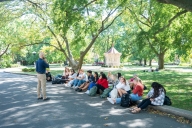You have /5 articles left.
Sign up for a free account or log in.
Student government representatives often butt heads with one another and especially with their institution’s administration, but at Metropolitan State University, in St. Paul, Minn., this dynamic led to the shutdown of the university’s Student Senate for more than seven months.
As was first reported on by the Twin Cities Pioneer Press, the leadership of the Student Senate found itself at odds with the university’s administration last August over a number of vacancies within the administration for positions that traditionally are meant to help serve minority students better. However, criticism of the administration grew into a polarizing divide among the students and eventually led to the end of the Student Senate.
Tina Martinez, who served as president of the Student Senate during the previous academic year, said there had always been tension and conflict within the organization. However, the debate over the minority services vacancies amplified the conflicts. Martinez said there were several resignations and a retirement within the student services area.
“Not everyone was as concerned -- but enough of us were concerned to say, ‘What’s happening?’ ” Martinez said. “[The administration] told us that they would get these positions refilled within the next month or two.”
Martinez said the vacant positions included the Native American student services coordinator, the Latinx and undocumented services coordinator, and a director of multicultural services, among others within student services. The administration promised Martinez and her fellow student leaders the positions would be filled by the end of last September, she said. When the positions remained unfilled by that point, tensions flared.
“There was a divide between the senate,” Martinez said. “It came to whether you believe that we need these services or whether you don’t. A lot of the minority students were fighting for these, talking about how these services were important to students. This became a heated conversation because, the way I see it, the administration didn’t like that we were questioning them.”
At an October meeting of the Student Senate, some students got into heated arguments with one another and some shouted at administration members. The administration then put the senate on a “pause,” asking them not to meet until some of the problems were remediated, Metropolitan State president Ginny Arthur said.
“The October meeting was very heated,” Arthur said. “We wanted to evaluate the situation, but unfortunately despite many efforts, [we couldn't] engage with three students and get them to come to the table to work on the interpersonal relationships among the student senators.”
The three students Arthur referred to were Martinez and two of her counterparts within the senate who felt the administration had not done all they could to address concerns. Arthur said that the university called in the Minnesota State Colleges and Universities system’s director for student development, Paul Shepherd, in response to student requests for an impartial look at the situation.
However, resolutions were not met, and with the damage done, the Student Senate didn’t meet again for the rest of the semester. Jessica Maistrovich, a member of the Student Senate who was not one of the three opposing the administration, said the organization’s leadership was to blame for its collapse. Maistrovich said the leadership refused to hold meetings after not being satisfied by the administration’s response and the senate was unable to hold new elections for the following year.
“There were a few students who managed, because they were in a position of power, to keep Student Senate deadlocked and not move forward or gain new members,” Maistrovich said. “They just locked us in place, and we couldn’t do anything.”
Maistrovich, who was plainly on the side of the administration, said that “bad behavior” at the October meeting was the real catalyst for trouble in the situation. Some had yelled at members of the administration during the meeting, she said.
When asked why the administration was so deeply involved with the internal politics of the organization, Arthur said the desire to maintain student representation is what led to the administration’s intervention.
“My concern is that there are nearly 11,000 students at Metropolitan and to ensure that they have representation,” Arthur said. “The level of interpersonal conflict that was going on within the senators certainly made me concerned.”
However, Maistrovich and other students are forming a new student organization with the blessing of the administration and plan to hold elections early in the new semester. Martinez and those who were dissatisfied with the university’s response have said they likely won’t be joining it.
“How I see it is that the administration thinks they can do whatever they want, but we can’t simply ask questions without being ‘disrespectful,’ ” Martinez said.








